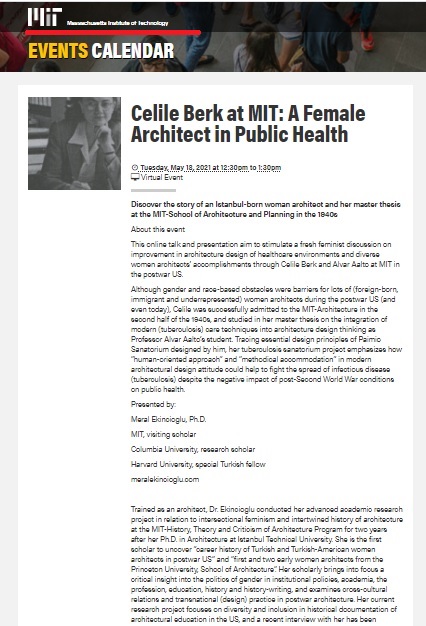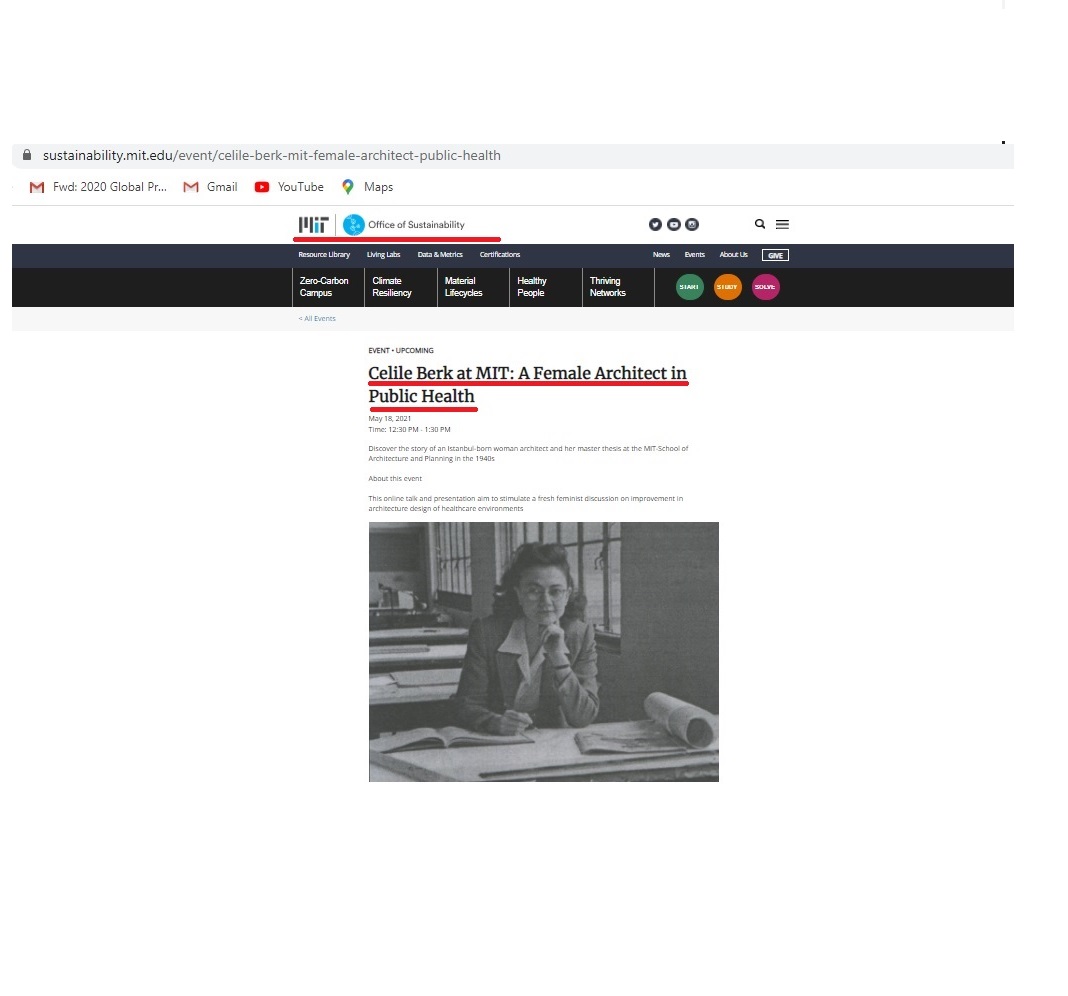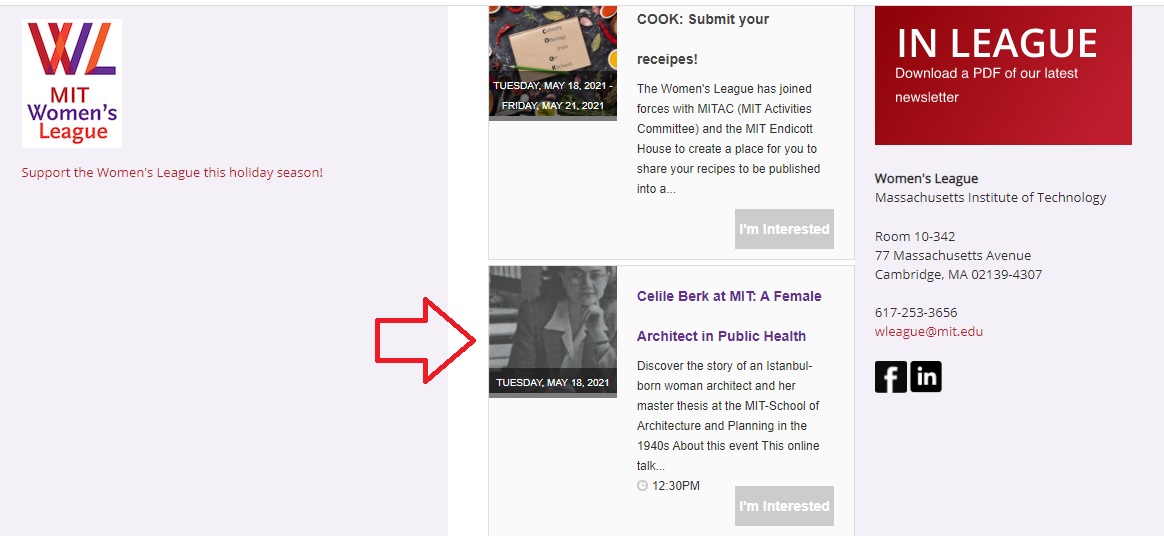Ekincioglu, M. (speaker), 2021, Celile Berk at MIT: A Woman Architect in Public Health, the MIT Women League, Massachusetts Institute of Technology, Cambridge, MA, May, 18th. (online presentation).
.
.
Although distorting effect of infectious-disease outbreaks has a potential to magnify existing g
ender and race-based inequalities within architecture, and this is still an overly critical fact in the field, there is an important and ongoing gap to examine and discuss women architects’ approach to problems generated by public health issues, and their significant contributions to this topic. Based on this problem, gap and concern in architecture and its history, this online talk and presentation uncover the story of an Istanbul-born woman architect and her master thesis at the MIT-School of Architecture and Planning: Celile Berk (1915-1984), an early woman graduate of Istanbul Technical University (1942) and her master thesis on tuberculosis sanatorium in Istanbul (1946-1947).
.
Although gender and race-based obstacles were barriers for lots of (foreign-born, immigrant and underrepresented) women architects during the postwar US (and even today), Celile was successfully admitted to the MIT-Architecture in the second half of the 1940s, and studied in her master thesis on the integration of modern (tuberculosis) care techniques into architecture design thinking as Professor Alvar Aalto’s student. Tracing essential design principles of Paimio Sanatorium designed by him, her tuberculosis sanatorium project emphasizes how “human-oriented approach” and “methodical accommodation” in modern architectural design attitude could help to fight the spread of infectious disease (tuberculosis) despite the negative impact of post-Second World War conditions on public health. At that point, it is important to underline that tuberculosis is still one of the top 10 causes of death in worldwide today and can have particularly severe consequences for women as the World Health Organization emphasized in 2018.
In light of this, this online talk and presentation aim to stimulate a fresh feminist discussion on improvement in architecture design of healthcare environments and diverse women architects’ accomplishments through “Celile Berk” and “Alvar Aalto” at MIT in the postwar US.
.
Although gender and race-based obstacles were barriers for lots of (foreign-born, immigrant and underrepresented) women architects during the postwar US (and even today), Celile was successfully admitted to the MIT-Architecture in the second half of the 1940s, and studied in her master thesis on the integration of modern (tuberculosis) care techniques into architecture design thinking as Professor Alvar Aalto’s student. Tracing essential design principles of Paimio Sanatorium designed by him, her tuberculosis sanatorium project emphasizes how “human-oriented approach” and “methodical accommodation” in modern architectural design attitude could help to fight the spread of infectious disease (tuberculosis) despite the negative impact of post-Second World War conditions on public health. At that point, it is important to underline that tuberculosis is still one of the top 10 causes of death in worldwide today and can have particularly severe consequences for women as the World Health Organization emphasized in 2018.
In light of this, this online talk and presentation aim to stimulate a fresh feminist discussion on improvement in architecture design of healthcare environments and diverse women architects’ accomplishments through “Celile Berk” and “Alvar Aalto” at MIT in the postwar US.
.
.
PowerPoint of my online talk is available in my personal archive; and its all rights reserved.
.
.
.
I am so pleased to receive positive feedbacks after my online talk at the MIT-Women League in order to uncover “women’s history at MIT”, like the following one:
“ Thanks for this program. We have so much to learn about women in general and especially how so many women before us have worked tirelessly to move the ball down the field! I truly enjoyed this presentation!”
Kate
"Cathryn J Baty" via e-mail by Kirsty Bennett, Manager at the MIT-Women League, May 18, 2021.
“ Thanks for this program. We have so much to learn about women in general and especially how so many women before us have worked tirelessly to move the ball down the field! I truly enjoyed this presentation!”
Kate
"Cathryn J Baty" via e-mail by Kirsty Bennett, Manager at the MIT-Women League, May 18, 2021.



My online lecture, "Celile Berk at MIT: A Woman Architect in Public Health, the MIT Women League, 5.18.2021;
http://calendar.mit.edu/event/celile_berk_at_mit_a_female_architect_in_public_health#.YKLfDKhKjIU, last accessed on 5.18.2021.
My online lecture, "Celile Berk at MIT: A Woman Architect in Public Health, the MIT Women League, 5.18.2021;
https://sustainability.mit.edu/event/celile-berk-mit-female-architect-public-health,
last accessed on 5.18.2021.
last accessed on 5.18.2021.
My online lecture, "Celile Berk at MIT: A Woman Architect in Public Health, the MIT Women League, 5.18.2021;
https://wl.mit.edu/, last accessed on 5.18.2021.